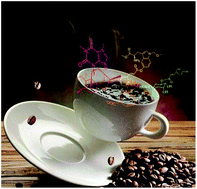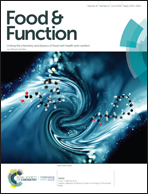The sources and mechanisms of bioactive ingredients in coffee†
Abstract
Coffee bioactive components include caffeine, chlorogenic acids (CGAs), trigonelline, tryptophan alkaloids, diterpenes and other secondary metabolites. During roasting, coffee metabolites undergo complex Maillard reactions, producing melanoidins and other degradation products, the most controversial among which is acrylamide, an ingredient widely found in baked food and listed as a second class carcinogen. Green and roasted coffee ingredients have good biological activities for the prevention of cardiovascular disease, and antibacterial, anti-diabetic, neuroprotection, and anti-cancer activities. To better understand the relationship between coffee ingredients and human health, and to effectively use the active ingredients, it is essential to understand the sources of coffee active ingredients and their mechanisms of action in the organism. This paper systematizes the available information and provides a critical overview of the sources of coffee active ingredients and the mechanisms of action in vivo or in vitro, and their combined effects on common human diseases.



 Please wait while we load your content...
Please wait while we load your content...